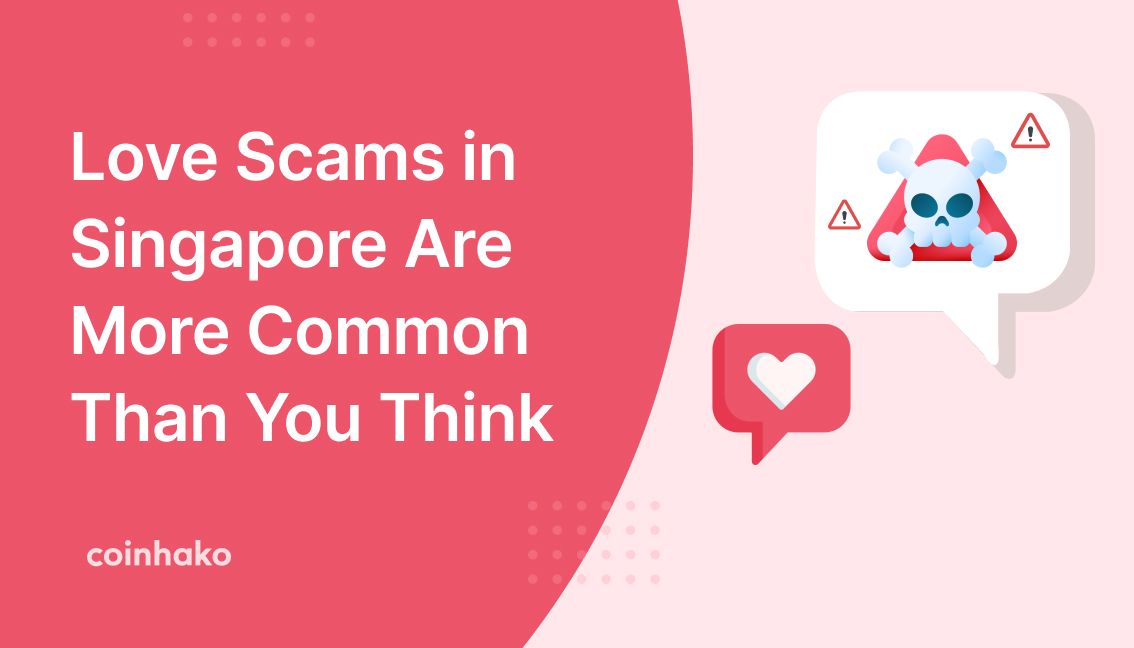Would you ever send $1 million in cash or crypto to someone you’ve never met in real life? In 2020, this was the total amount lost in a single internet love scam.
Time has brought upon many changes to several aspects of our lives, including personal relationships. Dating has evolved rapidly over the years, and with people’s increasing hectic schedules, many have turned to online dating apps to find their one true love.
While dating apps provide their users the benefits of convenience and choice, they come with their fair share of risks too - like internet love scams.
What is an internet romance (love) scam?
An internet love scams happens when a cybercriminal adopts a fake online persona to win their victim's affection and trust. The scammer then uses the illusion of a romantic or close relationship to manipulate and/or steal from the victim.
How prominent are love scams in Singapore?
If you’re reading this and thinking this would never happen to you, think again. The concept of internet love scams may seem far-fetched to the bulk of us, but love scams in Singapore are way more rampant than you think.
Within the first half of 2020 alone, the total value lost to love scams in Singapore amassed to an alarming $13.4 million - one unfortunate victim lost a total of $1 million SGD.
What are some tell-tale signs of a love scam?
Because no one wants to lose their hard-earned cash (or crypto) to scams of any kind, we’ve put together a few scenarios to help you identify what love scams might look like.
1. The person behind the online profile wants to establish a romantic relationship, WITHOUT meeting you in person.
Many of these online scammers will attempt to establish a romantic relationship with their desired victim. In a bid to win the victim’s trust, they may shower them with affection and attention to make the “relationship” seem more legitimate. Some victims have even received selfies from these scammers, creating the illusion that they are establishing a genuine connection with a real person.
2. Their online profiles present them as successful and attractive individuals
Online scammers may portray themselves as people who are already accomplished to impress their victims, eventually causing them to let their guard down. By depicting themselves as such, they can build the initial trust much faster and lure more victims to deceive.
3. They offer lavish promises of luxury items and travel.
Scammers may use empty future promises to make it seem like the relationship is mutual. In reality, only the victim will stick through the promises made.
In previous cases, scammers have deceived their unknowing victims into thinking they have sent luxury items from abroad. They then cheat their victims by saying the parcels have been detained by customs and require the victim to fork out a fee so that they can receive them.
To make the entire plot more believable, these scammers often engage the help of an accomplice, who gives the victim a phone call pretending to be a customs officer, demanding fees to release the items.
4. They confide in you about financial hardships/sob stories shortly after getting to know you.
Online scammers are adept at manipulating emotions, and may appeal to the victim by sharing fabricated stories of financial hardship and turmoil in an attempt to gain sympathy. Eventually, the trust built is used as an opportunity to swindle the victim’s money or possessions. Such requests will usually take place several times, sometimes starting from a small request before progressively increasing.
5. They ask you to transfer money on their behalf (money mule).
In other cases, after forming a closer relationship the online scammers will ask for their victims' help in transferring money on their behalf or using their name for unknown transactions.
They may ask the victim to share details of their bank accounts or to register their name for an undisclosed purpose. Usually, the victims end up being used to launder illegally obtained monies.
The sad truth to these situations is that the very people who fall prey to these scams will face consequences. For example, a victim unknowingly acting as a money mule can still be fined up to $500,000, jailed for up to 10 years, or both.
How can I avoid losing my money to a love scam?
These tell-tale signs are meant to warn and caution you of scam possibilities and should not stop you from finding love wherever it may be.
Here are some steps you can take, to prevent yourself from falling into such trap:
- Protect your online details. As a rule of thumb, for your security you should never share personal information with anyone on the internet to begin with.
- Never send money on behalf of anyone. Any transactions you make under your name is recorded forever and is on your accountability. Unscrupulous transactions that can be traced back to you, regardless of your innocence in the situation, can land you in hot waters.
- If the profile seems too good to be true, SWIPE LEFT. You may also try doing a reverse image search of the person’s profile picture to match up their details – if their information doesn’t add up, then it’s most likely a scammer.
- Stop communicating with the person immediately. For your safety, once you suspect you are caught in a love scam, you can contact the police on 1800-255-0000 or on the I-Witness website.
📩 Sign-up to Subscribe to our mailing list to have them delivered straight to your inbox!
👉Join our Telegram community
🤔If you have any enquiries, you may contact us here or you can visit our Information Page.
Coinhako is available in these countries!
🚀 Buy Bitcoin at Coinhako Singapore
🚀 Mua Bitcoin Coinhako Vietnam
Copyright © Coinhako 2021 All Rights Reserved. Read more on our terms of use of this blog.
All opinions expressed here by Coinhako.com are intended for educational purposes, taken from the research and experiences of the writers of the platform, and should not be taken as investment or financial advice.






